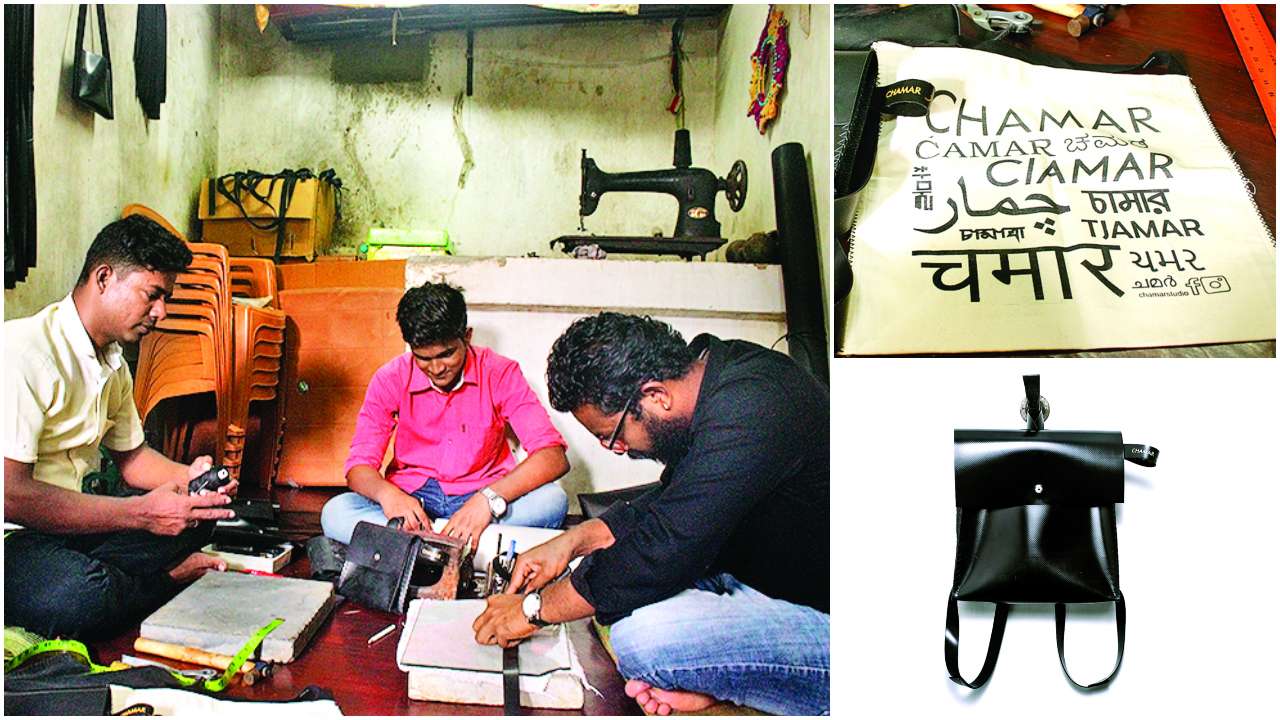
These used to be tanneries,” says artist and designer Sudheer Rajbhar, pointing to the godowns with computer parts and electronic goods stacked high that line the narrow Dharavi streets. “Thanks to the dip in the leather industry, only one of the many tanneries in this area remains.”
This was one of the discoveries that Rajbhar made while working on his art projects, Dark Homes and We Are Here because You Are There in August 2017. The latter focused on the skill-sets of so-called unskilled labourers and artisans. It was during this exhibition that he first experimented with the word chamar, making 40 cotton bags with the word printed on them in several languages. “People use the word as an expletive and treat them as untouchables, especially in villages. And Bhar, which is in my surname is often grouped with chamars. I wanted to take the word and turn it on its head,” he explains.
Since the dialogue around untouchability opened up, thanks to his design, he used the word for his line of bags (launched in late January 2018) in collaboration with leather workers and cobblers from different parts of Mumbai.
A typical day in Bhimshankare's life consists of sweeping the streets in and around Vakola between eight in the morning and noon, after which he dedicates a chunk of his time to making bags. "When we first started the project, it required less time, but ever since we created the brand, it's required more time," says the artisan, who also teahces students from the Government Polytechnic college in Bandra, as well as some interested youngsters from Dharavi. "The Polytechnic college is in a dismal state, and for kids like the ones I teach, it's a really sad state. People speak about skill-based education, but then the college doesn't even have a board announcing its presence."
The unfortunate conditions of Government Polytechnic is not the only thing that has detereorated. For leather workers in Dharavi, the income has seen a sharp fall with each government measure. "First there was vat, then sales tax and then GST. With each step, there was a fall in business for us," says 61-year-old Sahadev Vishwanath Nedke, adding that the beef ban has not helped their business either. He and his son Sunil Sahadev Nedke are some of the only remaining leather workers here, who also create bags for Chamar Studio. "There also used to be a lot of tourism associated with the leather factories. Busses filled with foreign tourists would come by and see our work. That's also not the case anymore."
And while the leather workers of the area have been associated with brands like Woodland, Fendi and even Prada, they get minimal wages in comparison.
Chamar Studio bags come as a welcome alternative. Made from recycled rubber sheets, they are both fire and water proof. “It takes half the time to make a bag with this material as opposed to leather,” says Sunil. “Leather has to go through a lot of other processes before you can finally shape it into shoes, bags, etc. The rubber sheets take on the required shapes right from the start.”
There is also an important division of income. “Fifty per cent of the profits go to the artisans,” states Rajbhar. “I also want to do a project wherein these artisans will collaborate with established artists and designers for a special line of bags, which we will auction in Bangalore. And I want to include their names in that label.”

[Clockwise)The male members of the Kumbhar family shape the pottery; the female members draw the motifs on them; one of Neeraj Dave’s modified designs]
While Chamar Studio continues its endeavours in urban spaces, Neeraj Dave decided to focus on the potters from the Kumbhar community of Gujarat’s Kutch region through his label, Dehaati Design Studio. “People associate the word dehaati with ignorance. For me, it means a simple and minimalist approach that cuts through the nonsense,” he explains.
Having launched the label in 2016, Dave now works primarily with two kumbhar families from Kutch’s outskirts, adding in some twists to the traditional designs. “There are around 85 different shapes, all of which are used in daily life, either for storing, serving, etc. The motifs painted on them are also unique, mostly focusing on nature,” he elaborates. “Sometimes, I change up the motifs, or add other elements to the terracotta work, such as aluminium or wood.”
For this, too Dave looks to local artisans who do wood-work or people who repair aluminium goods. “I want to work with people using different kinds of mediums from all parts of Gujarat,” he asserts.
With one of the brand’s latest lines – a line of glazed Raku pottery – has found its way into Good Earth stores in Mumbai, Dave’s dreams of expansion may not be so far off.
To see more work by Chamar Studio, you can check their work here